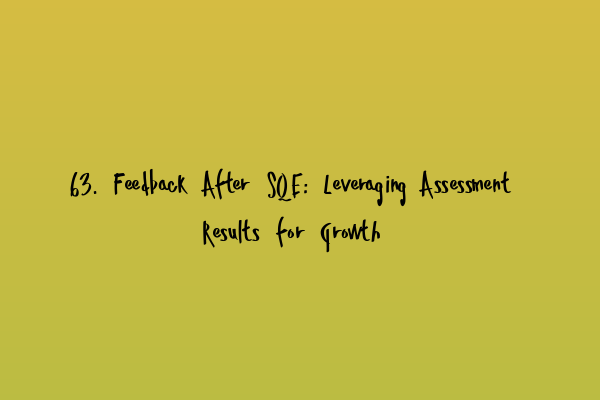63. Feedback After SQE: Leveraging Assessment Results for Growth
As a solicitor, the recently introduced Solicitors Qualifying Examination (SQE) holds great significance for both aspiring lawyers and the legal profession as a whole. The SQE replaces the previous Qualifying Law Degree (QLD) and Legal Practice Course (LPC) and aims to provide a more practical and standardized assessment of legal competence. With the first set of SQE exams already completed, it is crucial for candidates to understand how to interpret and leverage the feedback received to propel their growth and success in the legal industry.
Understanding the SQE Assessment
The SQE is divided into two stages: SQE1 and SQE2. SQE1 focuses on assessing candidates’ functioning legal knowledge, while SQE2 evaluates their practical legal skills through simulated real-life scenarios. Upon completion, test-takers receive detailed feedback in the form of a personalized performance report that outlines their strengths and weaknesses in each competency area.
Leveraging the Feedback
1. Reflect and Analyze: Start by thoroughly reviewing your performance report. Identify the areas where you excelled and the ones that need improvement. Take note of the specific competency areas and legal skills that require your attention. This analysis will serve as a roadmap for your future study and practice.
2. Identify Knowledge Gaps: Use the feedback to identify any knowledge gaps in your understanding of legal principles and concepts. This will help you focus your efforts on targeted areas to strengthen your foundation. To further enhance your knowledge, consider engaging in SQE 1 practice exam questions to test your understanding thoroughly.
3. Strengthen Practical Skills: For SQE2 candidates, the feedback report will provide insights into your performance in the simulated scenarios. Identify the legal skills that require improvement, such as client interviewing, case analysis, advocacy, or legal research. Enrolling in SQE 2 preparation courses will provide you with the necessary guidance and practice to refine these essential skills.
4. Seek Guidance: Sometimes, it’s vital to seek guidance from experienced solicitors or professional tutors who can provide personalized advice based on your feedback report. They can help you devise a strategic study plan and offer valuable insights to fine-tune your preparation for future assessments.
5. Practice Mock Tests: To further enhance your exam performance, consider taking practice mocks for both SQE1 and SQE2. These mock exams simulate the real exam conditions and can significantly boost your confidence levels. Practice mock FLK1 and FLK2 exams can specifically help you gauge your readiness for SQE1.
6. Plan for the Future: Alongside analyzing your feedback, it’s crucial to keep an eye on the SRA SQE exam dates and plan your preparation accordingly. Whether it’s taking advantage of availability gaps or devoting additional time to weaker areas, strategically planning your study schedule can maximize your chances of success in future SQE assessments.
Conclusion
The SQE marks a significant shift in the legal qualification process. Leveraging the feedback received after the SQE exams is vital for growth and success in the legal profession. By reflecting on your performance, identifying knowledge gaps, honing practical skills, seeking guidance, and practicing with mock exams, you can optimize your preparation for future assessments. Remember, continuous improvement and development are key to excelling in this dynamic and demanding field.
Related Articles:
– SQE 1 Practice Exam Questions
– SQE 1 Practice Mocks FLK1 FLK2
– SQE 2 Preparation Courses
– SQE 1 Preparation Courses
– SRA SQE Exam Dates
